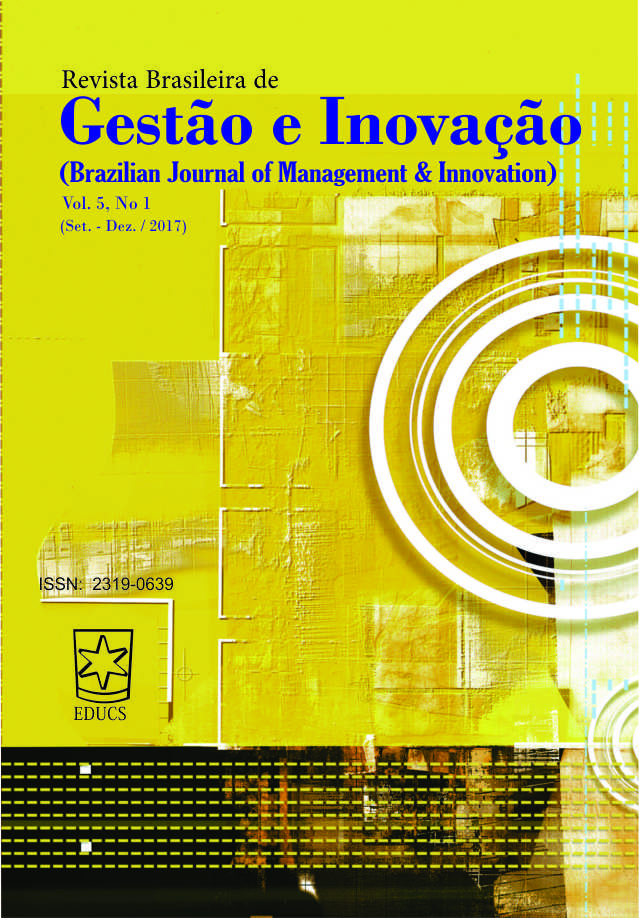A INOVAÇÃO COMO VANTAGEM COMPETITIVA: ESTUDO DE CASO EM UMA PEQUENA EMPRESA | INNOVATION AS A COMPETITIVE ADVANTAGE: CASE STUDY IN A SMALL BUSINESS
Keywords:
Inovação de Produtos, Inovação de Processos, Vantagem Competitiva, Abordagem Analítica.Abstract
O mercado mundial vive uma época marcada pela rapidez de informações e forte competitividade entre as empresas e mesmo entre países ou regiões. Os quais se veem obrigados a se adaptar rapidamente à situação apresentada. Diante disto surge o seguinte questionamento: Inovações geram vantagem competitiva em uma pequena empresa? Para responder esta questão de pesquisa, tem-se por objetivo identificar a importância das inovações no desempenho econômico e social de uma pequena empresa do ramo metalúrgico e de vidraçaria. Normalmente distingue-se inovação de produto e inovação de processo, porém na maioria das vezes estas inovações ocorrem concomitantemente, uma necessitando da outra. A vantagem competitiva das empresas está atrelada ao elo entre a rotina e a inovação, portanto, não está mais relacionada a tamanho ou volume de patrimônio. Trata-se de uma pesquisa com abordagem qualitativa, tendo como método um estudo de caso único. Quanto à técnica de pesquisa, utilizou-se entrevista com análise de conteúdo. Como conclusão destaca-se que apesar de barreiras como falta de mão de obra qualificada, recursos escassos e espaço físico limitado, a empresa apresenta perfil inovador e respondendo ao problema de pesquisa, a empresa reconhece a inovação como causadora de vantagem competitiva, a qual traz vários benefícios, como fidelidade de clientes e lucratividade, o que consequentemente associado a outros fatores, gera crescimento econômico e social da empresa.
DOI: 10.18226/23190639.v5n1.01
Downloads
Published
How to Cite
Issue
Section
License
The author must guarantee that:
- there is full consensus among all the coauthors in approving the final version of the document and its submission for publication.
- the work is original, and when the work and/or words from other people were used, they were properly acknowledged.
Plagiarism in all of its forms constitutes an unethical publication behavior and is unacceptable. Revista Brasileira de Gestão e Inovação has the right to use software or any other method of plagiarism detection.
All manuscripts submitted to RBGI - Revista Brasileira de Gestão e Inovação go through plagiarism and self-plagiarism identification. Plagiarism identified during the evaluation process will result in the filing of the submission. In case plagiarism is identified in a manuscript published in the journal, the Editor-in-Chief will conduct a preliminary investigation and, if necessary, will make a retraction.
This journal, following the recommendations of the Open Source movement, provides full open access to its content. By doing this, the authors keep all of their rights allowing Revista Brasileira de Gestão e Inovação to publish and make its articles available to the whole community.
RBGI - Revista Brasileira de Gestão e Inovação content is licensed under a Creative Commons Attribution 4.0 International License.
Any user has the right to:
- Share - copy, download, print or redistribute the material in any medium or format, linking to RBGI site.
- Adapt - remix, transform and build upon the material for any purpose, even commercially.
According to the following terms:
- Attribution - You must give appropriate credit, provide a link to the license, and indicate if changes were made. You may do so in any reasonable manner, but not in any way that suggests the licensor endorses you or your use.
- No additional restrictions - You may not apply legal terms or technological measures that legally restrict others from doing anything that the license permits.
#RBGI







